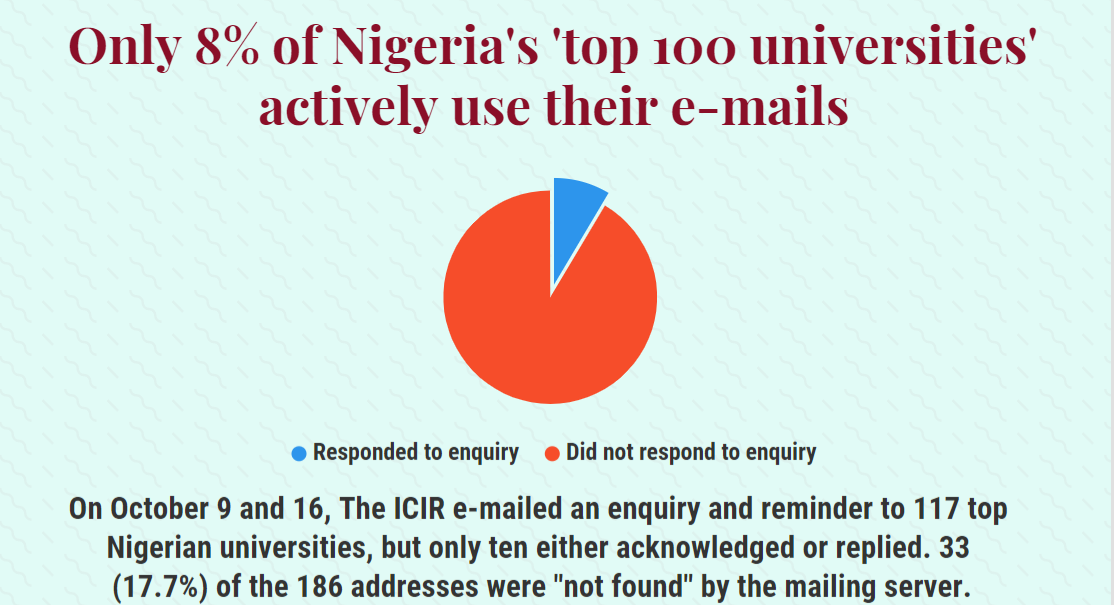The vast majority of Nigeria’s top universities either do not have official electronic mailing addresses or do not actively use them in responding to enquiries and requests, The ICIR has discovered.
A report published in May by The ICIR already established that the e-mailing culture among federal universities in the country is still very poor as only 13 out of 15 schools to whom enquiries were sent eventually responded.
Expanding the scope of the study, The ICIR again mailed an enquiry to universities on Tuesday, October 9 ― this time to 38 federal, 36 state and 43 private universities reported in 2017 to be among Nigeria’s best. Asides the total of 114 institutions on this list, close also to what may be obtained from the latest Webometric Ranking, the National Open University of Nigeria (NOUN), Nigeria Defence Academy (NDA), and Nigerian Law School were also included as part of the recipients.
Essentially the enquiry, presented to be from a doctoral candidate to aid ongoing research, requested for the current population of the schools, with a breakdown according to the number of students and staff strength. “If possible, I wish to also find out if the institution is residential and the percentage of students who benefit from available infrastructure for accommodation,” the e-mail added.
This enquiry was sent to a total of 186 e-mail addresses belonging to 117 institutions; and a week later, on October 16, a reminder was sent to the addresses.
Only 10 responded, acknowledged mail
Out of the over one hundred universities to which the enquiry was sent to , responses came from only ten (10) ― that is 8.5 percent.
The universities that were among the first set to respond include Redeemer’s University, Federal University of Petroleum Resources, Baze University, University of Ilorin, American University of Nigeria, Ekiti State University and Ladoke Akintola University of Technology.
Forty minutes after the e-mail was dispatched, Ipenko Ademola, Redeemer’s University’s Principal Assistant Registrar, sent a response directing the reporter to the school registrar. The latter, in his response, asked for the purpose of the request and a “letter of introduction to the effect” ― though the information asked for ought to be publicly available.
After an hour and half, Kennedy Ebakata, Special Assistant to the Vice Chancellor of the Federal University of Petroleum Resources, replied to say the enquiry “has been forwarded to the Registrar for appropriate action”. For Baze University, no worded response was received but Oshioreamhe Aghedo, the school’s Dean of Students, was copied by the general contact address.
The following day, October 10, the Vice Chancellor of University of Ilorin sent a response, likewise directing the reporter to the registrar or the university website. The registrar, who was part of the original recipients, however had no reply.
Daniel Okereke, the Executive Director of Communications and Publications, American University of Nigeria (AUN), also replied on October 10, giving answers to all enquiries. Total population of students, he wrote, is “slightly above 1,040 (Graduate 156, Undergraduate Above 900)” and for staff, nationals are 1,082 (as at September 2018) while expats are over 80.
He also said, “The institution is residential with about 98% of students on campus.” AUN’s Director of Communications, Innocent Nwobodo, also replied on October 19 to redirect the enquiry to the school’s Office of Institutional Research & Effectiveness, which he said had been copied and was equipped to address the questions.
The Examinations and Records Department of Ekiti State University also responded on this day, advising that the mail be directed to the Vice Chancellor. The school’s VC, however, did not respond to a mail sent to him on October 16.
Oddly, in its response on October 11, Ladoke Akintola University of Technology (LAUTECH) said, to get a response, the reporter “will have to make it formal by writing an official letter of request to registrar through your HOD”.


Following the reminder of October 16, four additional replies were received. One was from another official of AUN, Abba Tahir, Vice President for University Relations, who politely apologised for a belated reply and gave the assurance that his colleague would “package the required information and revert back”.
As promised, on October 19 and 24, his colleague, Amina Yuguda, responded with figures of total student and staff population.
Amos Kolo, Registrar at the Federal University of Technology, Minna (FUTMinna), sent in a response on October 26, with a two-page attachment signed by Jacob Yisa of Exams and Records Unit.
According to the document also dated October 26 and which was printed and scanned to answer the enquiry, the school has an undergraduate population of 19,355, a postgraduate population of 2584, a staff population of 2357, and the hostels accommodate a total of 2712 students.
Ife Oluwole, Deputy Registrar at the Federal University of Technology, Akure, also sent a response on the same day as FUTMinna. Writing on behalf of the Vice Chancellor, Joseph A. Fuwape, Oluwole said: “Kindly find below the information you requested for: student population 2017/2018 academic session: undergraduate- 17,505, postgraduate – 3,937, staff population – 2,461. The university is residential. About 10% of the student population benefit from the available residential bed spaces.”
Finally, on October 29, Bingham University, a private university founded in 2005 by the Evangelical Church Winning All (ECWA), also replied with a detailed breakdown of the current population of academic staff and students. It stated among other things that there are 238 members of academic staff, 2906 undergraduate students and 44 postgraduate students, 98 percent of whom reside on campus. The mail was signed by Nuhu Gado.
Soon after the first e-mail was sent out, an automatic response was received from Benue State University’s server, thanking the reporter for contacting the institution and assuring that the “mail is received with thanks and shall be treated urgently”. No urgent response has, however, been provided three weeks after.
READ THE FULL REPORT BELOW:
